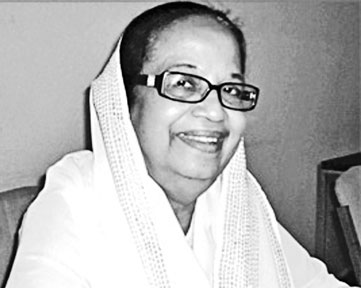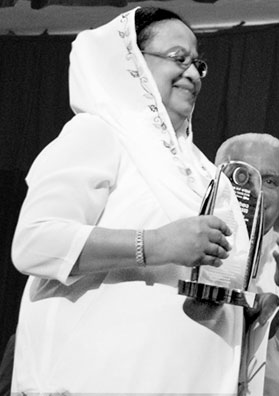I wanted to be a dancer - Jezima Ismail, educationist
by Carol Aloysius
The throb of village drums, colourfully dressed women singing folk
songs while pounding rice harvested from their small paddy fields, the
call for prayers by the local mulla intermingling with the sound of cow
bells and children's laughter; these memories still constantly flash in
Jezima Ismail's mind, despite having spent most of her eighty years of
life in Colombo."They are songs rooted in the culture of my village of
Sainthamarutha", she reminisces. Afraid these catchy songs of her
childhood would be mired under layers of modern culture and lost
forever, she says, "I am now recording them so I can showcase them for
future generations."
 Not surprising, it was this small village, two miles from Kalmunai in
the Ampara district that dominated most of our conversation when I met
this extraordinary educationist, campaigner for women's empowerment,
peace and reconciliation among other things at her present residence at
Kynsey Road, Colombo, recently. Not surprising, it was this small village, two miles from Kalmunai in
the Ampara district that dominated most of our conversation when I met
this extraordinary educationist, campaigner for women's empowerment,
peace and reconciliation among other things at her present residence at
Kynsey Road, Colombo, recently.
"It was where I was born and where I first attended school (Carmel
Convent, Kalmunai). Even when I can't be there physically, I re-visit
this beloved childhood village constantly in my thoughts," she said.
Elegantly dressed as always, in an off white lungi, a hijab covering
her head, her face is remarkably youthful, her eyes clear and very
focused, her skin smooth and unlined. Still recovering from the loss of
her life time companion and husband of over fifty years, Prof. Mahroof
Ismail who passed away last month, she says it is memories of childish
games she played with her late husband who also lived at Sainthamurtha
when she was a pre-schooler that keeps her being positive even at this
low ebb of her life. "We played hopscotch, hide and seek, marbles
together even though my presence was not always welcome. In fact (by his
own admission in his tribute on their golden wedding anniversary two
years ago,) Mahroof would often deliberately trample my toes so I
wouldn't join him and his friends at play. They thought I was a little
nuisance. But even then I had a mind of my own. I kept badgering them
till they finally gave in, notwithstanding the fact that I was an
'invisible presence' as they made it a point to ignore me", she smiles
her eyes tearing at the memory.
20th century
Talking to her it was evident that her fondest memories belong to the
20th century, a time when she was growing up in her beloved village at
the edge of Kalmunai.
Familiar village scenes crowd and merge in a kaleidoscope of colours,
scents and sights. She recalls the vivid colours of the tie and dye
saris woven by the women who wore them wherever they worked - at home,
and at the market place where they sold their home made products. " We
called them Kathankudy muruthan sarees or somana saris. They had squares
with green and white borders (this style is coming back now). Their
necks were adorned with red and black beads. I loved looking at their
clothes and especially their jewellery. When our family shifted to
Colombo, I began looking for them in all the ethnic shops I visited here
but have never found them. Perhaps they too have disappeared under the
welter of high fashion, like most other things that belonged to the 20th
century," she says sadly.
Scents
The smell of jasmines from potted plants at her Kynsey residence in
her home evokes the perfume of her favourite flowers. "All the women in
my village wore jasmines in their hair. I followed their example and
wore jasmines in my hair even when I was teaching," she recalls.
Her taste buds still tingle and mouthy, waters at the memory of 'Suruttu
sweets 'unique to her village and to the past century. "They were made
of sugar and dipped in red home made colouring and shaped like chillies.
They were so 'deleecious'! We couldn't wait for the toffee cart man who
had a brisk business down our lane alone as all the houses were
connected and almost everyone was related and had extended families".
Souvenirs
She brings out treasures from her past: an old couch, an antique
chest, a rusted spittoon, an enormous brass bowl used for making conjee
which her family often made and shared with the rest of the village,
ladling spoons. When my eyebrows lift in askance at the large piece of
wood standing sentinel near her entrance, she hastens to explain, " It
is from my village. All the houses used to barricade their front door
with similar planks. I now use it for the same purpose." An antique
piano, given by her father when she had turned fifteen stands in a
corner of her dining room. "I used to play on it until my late husband
started playing the piano. He was a superb pianist so I just stopped
playing as I was no match for his rare talents", she admits. She however
obliged us with a few bars from Brahms which she played with much
emotion.
Music and dancing
"I was the youngest of three girls. My father wanted each of us to
learn a musical instrument and oriental dancing (Manipuri and later
Bharathanatyam) as there was no western dancing then. So he got down
teachers from India who taught us the veena, harmonium and violin. I
loved music, dancing and drama. If I had my way I would have been a
singer or dancer." Those poignant childhood memories influenced many of
her decisions in later years.
Academic
Commenting on her chequered academic career, she says, "My father was
an irrigation engineer, ( the first Muslim engineer) and was transferred
to different parts of the island. I had my nursery education at Kalmunai,
my primary and part of my secondary education at St Bridget's Convent,
Colombo. When the war broke out I was transferred to St Vincent's Girls
High School, Batticaloa. When I look back, I had most of my education in
the North Central and Eastern Provinces."
 She recalls that how her father, wanted his three girls to have an
all round education. She recalls that how her father, wanted his three girls to have an
all round education.
"He got down tutors to teach us at home when we were very young and
later sent us to the best private schools (there were no state schools
then. ) He also encouraged us to do extra curricular activities and lots
of outdoor sports.
He also influenced my choice of a career. It was my father who
insisted I become a teacher after I left the university. I remember when
I told him I wanted to be a singer and dancer he said, "Absolutely not.
Take up a teaching post in any school you wish".
Education then and now
As an educationist who critically evaluated the progress of her
students and was personally involved in the classroom even as a
principal, she thinks one of the biggest drawbacks in the present system
is that children have no time for play.
"When we were little, as soon as we returned from school we used to
go outside and play till it was dinner time. We didn't have much
homework as we finished most of it in school. The teachers were both
dedicated, and disciplined . If you came unprepared for a lesson you
were punished. But they were also our best friends. We could approach
them with our problems and they would take time to counsel us. They
became part of our family circle".
She admits she carried those childhood impression of the early
forties into her own teaching career. "In the 1960s I wrote some
recommendations after evaluating the education system during a research
study on teaching methodology. I feel they are valid even now, as
teachers today are not doing enough to encourage students to be more
creative. They should be more pupil focused and Principles should devote
more time for classroom teaching so as to get to know their students
well, she says.
University
In the early fifties, she became one of the first few Muslim women to
enter the Peradeniya University.
Her experiences of ragging, she recalls as being, 'fun'. "We were
ducked into the swimming pool, or had to recite poems. Till now most of
us freshers and seniors keep in touch ( those few still living!) and
share our experiences down the years."
It was while at the University that Jezima also showed her talents in
table tennis and badminton when she even managed to get university
colours while playing against her husband's team (he was the badminton
captain and coach) in Colombo.
When modern technology found its way to her district, one of the
first things her village got was a transistor radio. "The women loved
it. They used to tie it to the horns of the bulls which they took to the
fields so that they could dance to the songs!" she says giggling at the
memory...
Her most frightening moment?
"The 1983 riots. I was then Principal of Muslim Ladies College,
Colombo, and was seated at my desk when I saw this huge truck full of
drunken persons stopping outside the school.
When I went out, they told me our school would be the next target for
the bonfires they were starting all over the city. I immediately
contacted my friends at the Sri Lanka Broadcasting Corporation to help
me and they did. It broke my heart to see how all our dreams of a Sri
Lankan identity for which I had long been fighting for, simply went up
in flames that day in our beautiful paradise island.".
Activist
Even before 1983, Jezima says she had been on a personal mission for
peace and reconciliation. I started PAFREL after I read about the JVP
violence in 1966, and have since, tried to get people of different
ethnic groups to sit down and discuss this problem and how we can win
the trust and faith in others and learn to hope again".
Her happiest day?
"Marrying Mahroof. I was five years and he, ten years when we became
childhood playmates. Our fifty years of marriage was able to withstand
every obstacle in our way. I thank God for having given me a husband who
was my friend and counsellor with whom I shared everything," she says
with emotion.
As a campaigner for gender equality I ask her, "If you had a choice,
would you have liked been born as a woman or man?" She replies without
hesitation." Definitely a woman.
Living in a patriarchal society is a big challenge to women. But as
in Sri Lanka they comprise more than half the labour force and are also
more literate, I am convinced they have the capacity to keep the balance
well, because they are equipped for that task".
Future plans?
"Now that I have reached the age of eighty, I don't want to take on
more responsibilities and would like to spend time with my
grandchildren... It's time for younger people to take on leadership
posts. I am always ready to share my knowledge with them".
I ask her the secret to her healthy longevity.
"Live simply. Be positive. Eat healthy. And have blind faith in God,"
she says. |

